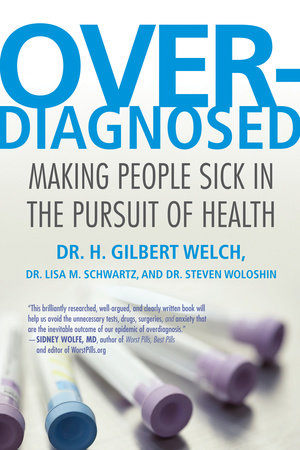Excerpt
Overdiagnosed
My first car was a ’65 Ford Fairlane wagon. It was a fairly simple—albeit
large—vehicle. I could even do some of the work on it myself. There was a lot
of room under the hood and few electronics. The only engine sensors were a
temperature gauge and an oil-pressure gauge.
Things are very different with my ’99 Volvo. There’s no extra room under
the hood—and there are lots of electronics. And then there are all those little
warning lights sensing so many different aspects of my car’s function that
they have to be connected to an internal computer to determine what’s wrong.
Cars have undoubtedly improved over my lifetime. They are safer, more
comfortable, and more reliable. The engineering is better. But I’m not sure
these improvements have much to do with all those little warning lights.
Check-engine lights—red flags that indicate something may be wrong
with the vehicle—are getting pretty sophisticated. These sensors can identify
abnormalities long before the vehicle’s performance is affected. They are
making early diagnoses.
Maybe your check-engine lights have been very useful. Maybe one of
them led you to do something important (like add oil) that prevented a much
bigger problem later on.
Or maybe you have had the opposite experience.
Check-engine lights can also create problems. Sometimes they are false
alarms (whenever I drive over a big bump, one goes off warning me that
something’s wrong with my coolant system). Often the lights are in response
to a real abnormality, but not one that is especially important (my favorite is
the sensor that lights up when it recognizes that another sensor is not sensing).
Recently, my mechanic confided to me that many of the lights should
probably be ignored.
Maybe you have decided to ignore these sensors yourself. Or maybe
you’ve taken your car in for service and the mechanic has simply reset them
and told you to wait and see if they come on again.
Or maybe you have had the unfortunate experience of paying for an
unnecessary repair, or a series of unnecessary repairs. And maybe you have
been one of the unfortunate few whose cars were worse off for the efforts.
If so, you already have some feel for the problem of overdiagnosis.
I don’t know what the net effect of all these lights has been. Maybe they
have done more good than harm. Maybe they have done more harm than
good. But I do know there’s little doubt about their effect on the automotive
repair business: they have led to a lot of extra visits to the shop.
And I know that if we doctors look at you hard enough, chances are we’ll
find out that one of your check-engine lights is on.
A routine checkupI probably have a few check-engine lights on myself. I’m a male in my midfifties.
I have not seen a doctor for a routine checkup since I was a child. I’m
not bragging, and I’m not suggesting that this is a path others should follow.
But because I have been blessed with excellent health, it’s kind of hard to
argue that I have missed out on some indispensable service.
Of course, as a doctor, I see doctors every day. Many of them are my
friends (or at least they were before they learned about this book). And I can
imagine some of the diagnoses I could accumulate if I were a patient in any
of their clinics (or in my own, for that matter):
• From time to time my blood pressure runs a little high. This is particularly
true when I measure it at work (where blood pressure machines are
readily available).
Diagnosis: borderline hypertension• I’m six foot four and weigh 205 pounds; my body mass index (BMI) is 25.
(A “normal” BMI ranges from 20 to 24.9.)
Diagnosis: overweight• Occasionally, I’ll get an intense burning sensation in my midchest after
eating or drinking. (Apple juice and apple cider are particularly problematic
for me.)
Diagnosis: gastroesophageal reflux disease• I often wake up once a night and need to go to the bathroom.
Diagnosis: benign prostatic hyperplasia• I wake up in the morning with stiff joints and it takes me a while to loosen
up.
Diagnosis: degenerative joint disease• My hands get cold. Really cold. It’s a big problem when I’m skiing or
snowshoeing, but it also happens in the office (just ask my patients). Coffee
makes it worse; alcohol makes it better.
Diagnosis: Raynaud’s disease• I have to make lists to remember things I need to do. I often forget
people’s names—particularly my students’. I have to write down all my
PINs and passwords (if anyone needs them, they are on my computer).
Diagnosis: early cognitive impairment• In my house, mugs belong on one shelf, glasses on another. My wife
doesn’t understand this, so I have to repair the situation whenever she
unloads the dishwasher. (My daughter doesn’t empty the dishwasher, but
that’s a different topic.) I have separate containers for my work socks,
running socks, and winter socks, all of which must be paired before they
are put away. (There are considerably more examples like this that you
don’t want to know about.)
Diagnosis: obsessive-compulsive disorderOkay. I admit I’ve taken a little literary license here. I don’t think anyone
would have given me the psychiatric diagnoses (at least, not anyone outside
of my immediate family). But the first few diagnoses are possible to make
based solely on a careful interview and some simple measurements (for example,
height, weight, and blood pressure).




